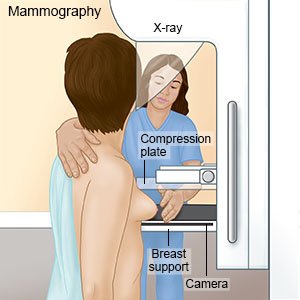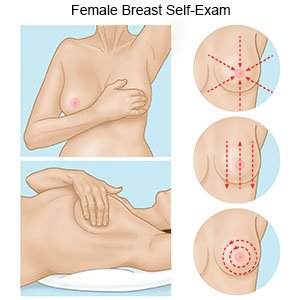Breast Mass
Medically reviewed by Drugs.com. Last updated on Sep 1, 2024.
What do I need to know about a breast mass?
A breast mass is a lump or growth in your breast or underarm. A cyst (fluid-filled pocket), an injury, or changes in your breast tissue are the most common causes. A breast mass can also be caused by cancer. You must follow up as directed to find the cause of your breast mass.
How is a breast mass evaluated?
Your healthcare provider will perform a breast exam to feel the mass. Tell him or her when you noticed the breast mass, and if it has changed in size. Tell him or her if you have any other symptoms, such as pain, fever, or nipple discharge. He or she will ask if you have a personal or family history of breast disease or cancer. He or she will also ask if you had an injury, biopsy, or surgery on your breast.
- Aspiration is a procedure used to withdraw fluid or cells from your breast mass to be tested for cancer.
- A mammogram is an x-ray to examine your breast mass. Healthcare providers will also look for other lumps or tissue changes in your breast.

- An ultrasound uses sound waves to look for a cyst or tumor.
Why is it important to continue breast self-exams?
Check your breast for changes in size, shape, or feel of the breast tissue. Check under your arms and all around your breasts. If you have monthly periods, examine your breasts after your period is over. Contact your healthcare provider if you notice any changes in your breasts. If you have questions, ask for more information on how to do a breast self-exam.
 |
When should I call my doctor?
- Your breast mass returns or grows larger.
- You have pain in your breast or underarm.
- You have nipple discharge.
- You notice other changes to your breasts or nipples, such as dimpling or a rash.
- You had an aspiration and you have redness, pain, swelling, or warmth near the aspiration site.
- You have a fever.
- You have questions or concerns about your condition or care.
Care Agreement
You have the right to help plan your care. Learn about your health condition and how it may be treated. Discuss treatment options with your healthcare providers to decide what care you want to receive. You always have the right to refuse treatment. The above information is an educational aid only. It is not intended as medical advice for individual conditions or treatments. Talk to your doctor, nurse or pharmacist before following any medical regimen to see if it is safe and effective for you.© Copyright Merative 2024 Information is for End User's use only and may not be sold, redistributed or otherwise used for commercial purposes.
Further information
Always consult your healthcare provider to ensure the information displayed on this page applies to your personal circumstances.
